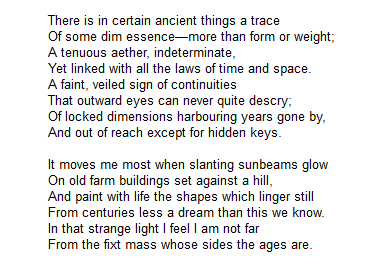Substack Notes Roundup #6
History, fairies, forgiveness, and more...
This is the 6th collection of my most recent Substack notes. I have included a few recommendations in the end. Enjoy!
“The eternal silence of these infinite spaces frightens me.”
— Blaise Pascal, Pensées
“My work is not a piece of writing designed to meet the taste of an immediate public, but was done to last for ever.”
― Thucydides, History of the Peloponnesian War
Rudeness is nothing but pride manifested outwardly.
We have become so detached from the act of writing.
I can’t tell how many times I’ve had friends tell me, after I had suggested they should start writing:
“Oh no, I could never write like you do”
“How do you do this? I don’t have the patience”
“No way. My writing way too bad for people to read”
“I’m just not philosophically inclined so I can’t write”
What? Who said anything about philosophy?
That’s a shame really because I used to be like this about a year ago. I used to think I had to be perfect from the get go.
But it all comes down to the moment of realization that it doesn’t really matter. Many Substack writers write simply as a way of keeping a journal or a collection of thoughts or to satisfy a sudden burst of ideas. So can anyone.
You’ll probably suck at the beginning. So what? You won’t suck after six months if you put your mind to it.
You’ll probably not reach C. S. Lewis levels of articulation or Dostoevsky levels of drama, but ask yourself: is that really the purpose of writing?
Get out there. Write for YOU. Make it a habit and train yourself in written thought.
And the most beautiful thing? Once you start there is no stopping it.
Let truth guide your words and trust that you’ll find the way soon enough.
“The human mind, endowed with the powers of generalization and abstraction, sees not only green-grass, discriminating it from other things (and finding it fair to look upon), but sees that it is green as well as being grass. But how powerful, how stimulating to the very faculty that produced it, was the invention of the adjective: no spell or incantation in Faerie is more potent.”
— J. R. R. Tolkien, On Fairy Stories
'Then Peter came to Him and said, “Lord, how often shall my brother sin against me, and I forgive him? Up to seven times?” Jesus said to him, “I do not say to you, up to seven times, but up to seventy times seven.”'
— Matthew 18:21-22 (NKJV)
We have been led by our own pride and ignorance to believe that forgiveness makes us weak and cowardly. But failing to forgive those who did us wrong will stir up anger and hate in the soul.
How often do we ruminate on the evil deeds that others have done to us?
We thus do not forgive only for the sake of the person next to us. We forgive for ourselves as well; to cleanse our souls from malice and resentment.
The reason for forgiving is not weakness, but love.
Pinocchio, by Carlo Collodi (1883)
Witty, subversive, and very much didactic.
As an adult you approach this story from an entirely different perspective.
H.P. Lovecraft, Fungi from Yuggoth - XXXVI. Continuity
Recommendations
If you enjoy my work you can support me with a one-time donation by clicking below. Much appreciated!













Thank you for including me in your recommendations!
This is a showcase of how well-rounded and thoughtful your study is. I want to read History of the Peloponnesian War as well, and this is further encouragement to find myself a copy. I look forward to your next notes roundup! Also, thank you so, so much for recommending my article on here! I am so grateful for how much you’ve helped my Substack page reach so many others! :-)